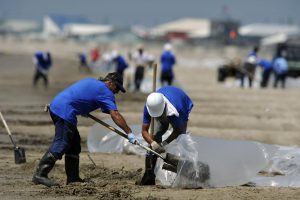
Walter Castro spent months after the BP oil spill disaster in 2010 measuring air quality along beaches across the Gulf Coast, a task that regularly led him to inhale fumes that reeked of chemicals as he put in long days for weeks at a time.
The 52-year-old Metairie resident claims that contaminated water splashed into his face, exposing him to oil and chemical dispersants that irritated his skin and burned his eyes. On one monitoring mission, he says, he got sick and began shaking violently, and so did the rest of his boat crew.
Castro says in court filings that he requested personal protective equipment, including respirators, but was turned down, and yet was instructed to return to areas where he had measured high levels of benzene, a known carcinogen.
He says he was working for a local subcontractor, Industrial Safety and Health, one of "a multitude of contractors involved in the process" that were ultimately working on behalf of BP.
Years later, Castro was diagnosed with the same chronic conditions for which BP had agreed to compensate response workers — to the tune of a $60,700 payout per worker — as part of a broader medical settlement.
“Even now, I’ll get points where I start feeling nauseous. The sinus, when you wake up you’re feeling the sinus, you’re feeling the pressure, you’re feeling the headaches that come associated with it,” Castro said in an interview. “And it’s almost on occasions that you’ll get the full load of the symptoms that we had back then. They’ll all kick in at the same time.”
Bobby Bradberry, an assistant fire chief in Grand Isle at the time of the spill, can relate. He was among the spill’s first responders, checking oil booms and monitoring the coastline, as well as helping sick clean-up workers as an EMT. He worked on the emergency response and the clean-up for nearly two years, and believes he was exposed to toxic oil fumes and chemicals at all hours of the day.
Coming in contact with contaminated water caused Bradberry’s skin to itch and become irritated, he claims. He said a plane once sprayed him with Corexit, a chemical dispersant BP used in unprecedented quantities to break up the oil. It got in his eyes, he said, and stung worse than mace.
Visit our Oil Spill Remediation Services page here.
Source: The Acadiana Advocate


